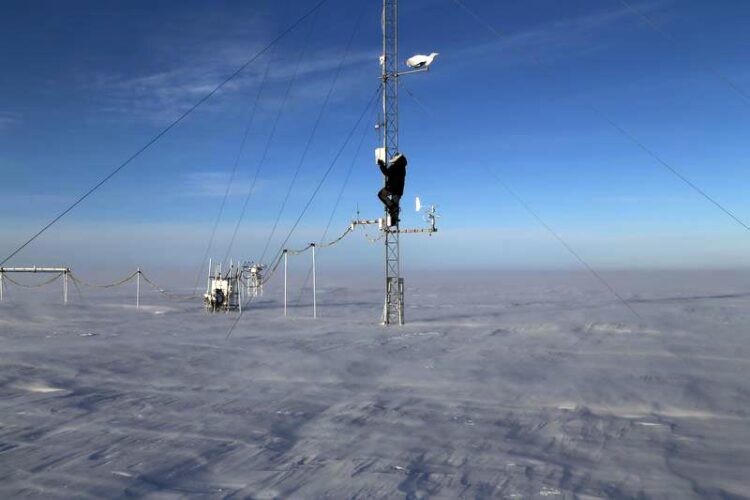POLARIN: Network for polar research infrastructures

Maintenance work at the meteorological tower at Neumayer-Station III, Antarctic
Photo: Alfred-Wegener-Institut / Elke Ludewig
From now on, a network of 50 partner institutes will provide access to polar research infrastructures. Over the next five years, the European Union will provide 14.6 million euros in funding for the new POLARIN project (Polar Research Infrastructure Network). Slated to officially launch on 1st March 2024, the project will promote interdisciplinary research that addresses the scientific challenges in both polar regions.

Use of a CTD with Kranzwassererschöpfer on board the research vessel Polarstern. Photo: Alfred-Wegener-Institut / Susann Henkel
The polar regions play a pivotal role in the Earth system and are particularly important for our climate. In order to understand and predict the complex processes at work in these regions, and in order to provide data-based information, the polar research community needs access to world-class research infrastructures that can function in said regions. The EU-funded POLARIN project (Polar Research Infrastructure Network) will deliver fully financed, cross-border, virtual and remote access to 64 polar research infrastructures and promote interdisciplinary research that addresses the scientific challenges in both polar regions. To make that happen, a network of partner institutes from Europe and beyond (e.g. from Canada, the USA, Great Britain, Ukraine and Chile) has been formed. POLARIN is the largest project currently being coordinated by the Alfred Wegener Institute, Helmholtz Centre for Polar and Marine Research (AWI). From 1st March 2024, the EU will provide 14.6 million euros for POLARIN over the next five years.
The polar regions are of critical importance for our climate. At the same time, they are considered to be early-warning systems for climate change and focus areas for human expansion and the exploration of new resources. The two regions are characterised by progressive ice loss and rapidly changing oceans and landmasses. The consequences of this polar transformation can be felt across the planet and affect human beings in various ways. Accordingly, political decisionmakers need data-based recommendations on the future use of the polar regions. However, there are few research infrastructures that can operate in these remote, extreme environs. Providing access to and integrating research infrastructures is the key to strengthening European research. In addition, doing so will improve observational and modelling capacities in terms of overcoming the great challenges that these regions – and, due to global interactions, the entire “Earth system” – are facing.
“What sets POLARIN apart is that, for the first time, we’ll be offering access to research infrastructures in the Arctic and Antarctic alike through a single project,” explains Dr Nicole Biebow, the project’s coordinator at the Alfred Wegener Institute. “We’ve created a network of dovetailing and interdisciplinary research infrastructures that encompasses all related research areas – from marine and terrestrial research to the atmosphere. The approach is innovative and unique. It’s the only project of its kind.”
POLARIN will provide international access to 64 leading polar research infrastructures, including their Arctic and Antarctic research stations, research vessels and icebreakers at both poles, observatories (on land and at sea), data infrastructures, and repositories for ice and sediment cores. On the one hand, this will be done by allotting slots within the respective infrastructures; on the other, virtual access will be granted to e.g. data infrastructures. Moreover, POLARIN will offer remote access to the infrastructures – which means, researchers will be able to request samples, datasets and other resources, which will then be gathered / prepared at the respective infrastructure without any need for the requester to be on site. Consortium members from Germany include the Alfred Wegener Institute, Helmholtz Centre for Polar and Marine Research (AWI) with international access to the research icebreaker Polarstern and the Neumayer Station III, the Helmholtz Centre Potsdam GFZ German Research Centre (GFZ), and FL Polar Operation GmbH (FLPO).
Challenge-driven calls for proposals will be used to ensure that POLARIN-financed projects address the specific challenges identified by international organisations and programmes, contribute to larger-scale European and international initiatives, and facilitate policy formulation. In addition, POLARIN will improve online services, data access, and interoperability between systems, while also ensuring that future generations receive training on using cutting-edge research infrastructures. The training will include seminars on topics like planning for field work, how to sustainably use research infrastructures and technological equipment, and gathering and handling data, as well as special safety training for the polar regions.
Wissenschaftliche Ansprechpartner:
Dr Nicole Biebow
+49 (0)471 4831-1011
nicole.biebow@awi.de
Weitere Informationen:
Media Contact
All latest news from the category: Information Technology
Here you can find a summary of innovations in the fields of information and data processing and up-to-date developments on IT equipment and hardware.
This area covers topics such as IT services, IT architectures, IT management and telecommunications.
Newest articles

NASA: Mystery of life’s handedness deepens
The mystery of why life uses molecules with specific orientations has deepened with a NASA-funded discovery that RNA — a key molecule thought to have potentially held the instructions for…

What are the effects of historic lithium mining on water quality?
Study reveals low levels of common contaminants but high levels of other elements in waters associated with an abandoned lithium mine. Lithium ore and mining waste from a historic lithium…

Quantum-inspired design boosts efficiency of heat-to-electricity conversion
Rice engineers take unconventional route to improving thermophotovoltaic systems. Researchers at Rice University have found a new way to improve a key element of thermophotovoltaic (TPV) systems, which convert heat…



